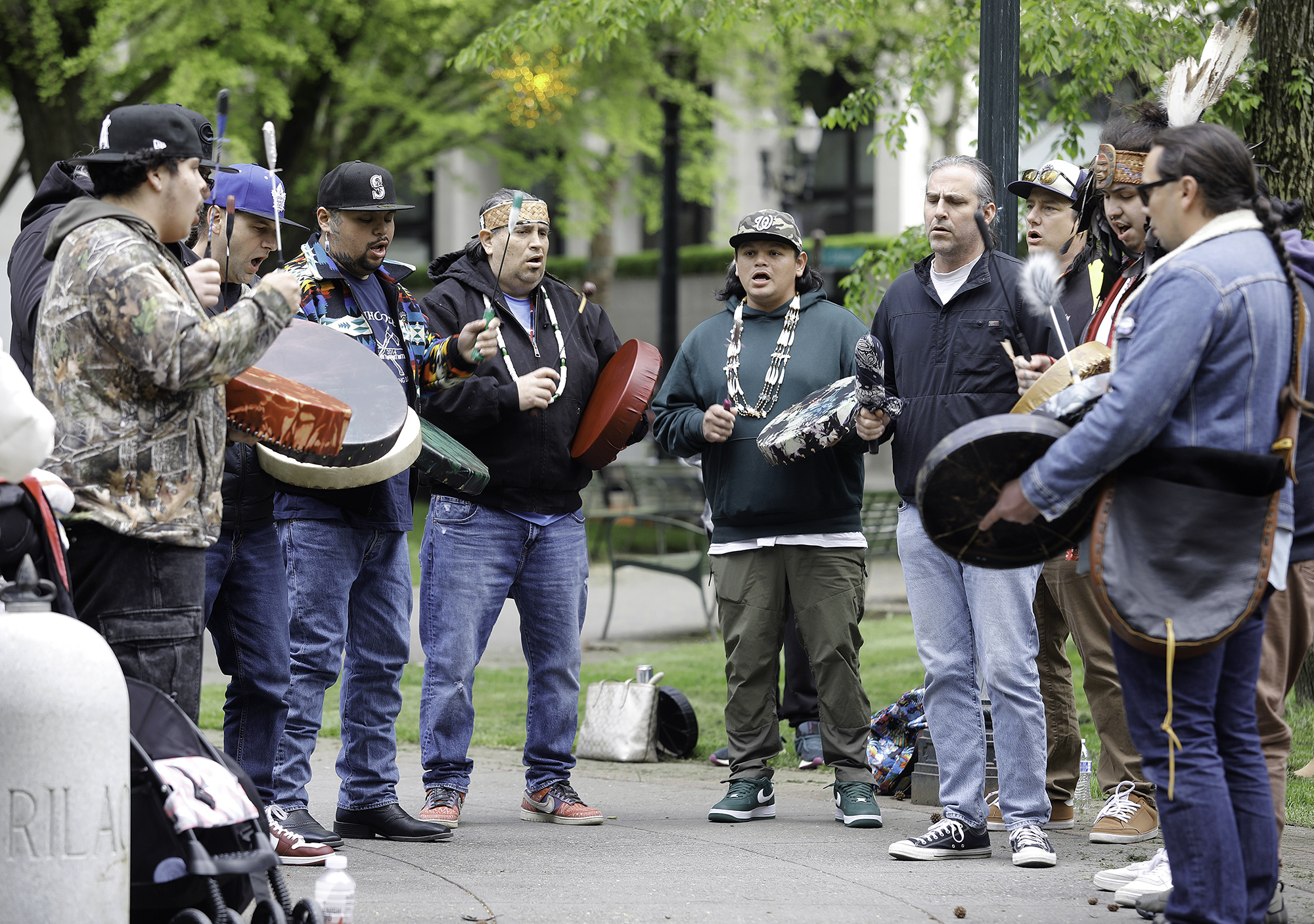Tribal Government & News
Judge will issue Willamette Falls decision by August

By Nicole Montesano
Smoke Signals staff writer
Tribal members holding their breath over the outcome of Portland General Electric’s effort to take ownership of Willamette Falls will have to wait, as Judge Michael Simon said he plans to issue a written decision within 30 to 90 days of the Tuesday, May 6, closing arguments.
In a six-day trial that began Monday, April 21, at the Mark O. Hatfield United States Courthouse, PGE sought to condemn 5 acres at the falls, where the Tribe has a removable seasonal fishing platform it uses for an annual ceremonial catch of up to 15 hatchery spring Chinook.
Assistant Tribal Attorney Kimberly D’Aquila argued that PGE’s lawsuit was filed in bad faith to appease other Tribes.
“For generations, PGE has operated its hydropower plant safely and effectively, using rights it already holds,” she said. “Those rights are still sufficient…It’s not about what PGE needs; it’s about what it wants. And that distinction is key in the federal condemnation act.”
PGE said it needs ownership of the falls to comply with its hydropower operations license.
“Someone attending this trial might be forgiven if they came away with the impression that this case was all about whether a single Native American Tribe should have access to those rocks for a fishing platform and under what terms,” PGE attorney Erick Haynie of Perkins, Coie, LLP said in his closing memo.
“But this case is actually about something else: The conflict created when the state of Oregon stepped into the fray,” by claiming its right “to grant third-parties the rights to access, occupy, and build structures within an area of Willamette Falls that has been in active use by PGE for hydroelectric operations for over 100 years,” Haynie wrote.
PGE’s federal license was last renewed in 2005. It states that within five years of receiving it, PGE “shall acquire title in fee or the right to use in perpetuity all lands … necessary or appropriate for the construction maintenance and operation of the project.”
Yet, D’Aquila said, for years, PGE made no effort to acquire the property. Instead, it leased a third of an acre where the dam structure is located at the top of the falls. Nor did the Federal Energy Regulatory Commission tell PGE to acquire it, including after an inspection last year that found PGE was in “full compliance with all license issues,” D’Aquila said.
PGE officials testified that, until 2018, when the state granted Grand Ronde a waterway registration to build a fishing platform, they believed they had sole control over the falls. Mark Lindley, PGE’s senior principal attorney for real estate strategy, acquisitions and dispositions, testified that the state’s action was “a wakeup call.”
At that point, Haynie noted, PGE began trying to acquire the property.
“Only after years of efforts … including through negotiation, property ownership studies, administrative appeals, two mediations, offers to lease and offers to purchase, PGE has determined that condemnation is the appropriate remaining option to finally secure that control in satisfaction of its safety and regulatory obligations,” he wrote.
D’Aquila argued that PGE’s own maps identified the area as belonging to the state and that PGE had made no objections in 2016 when it reviewed a similar application from the Tribe.
Further, she argued, “The state offered access and control; PGE rejected it, unless the registration rights were terminated.”
She noted that, “PGE’s own communications with the board (of directors) reference a property dispute, not a license necessity. PGE didn't stop discussions because of public safety or operations. It stopped because one of its business partners objected to what another one was doing under state rules.”
Haynie acknowledged that PGE had “paused” lease talks with Grand Ronde after other Tribes raised objections. He said the utility was taking the time to listen and learn.
“I think it’s appropriate to listen to other Tribes,” he told Simon.
The Confederated Tribes of Siletz Indians participated as a “friend of the court,” on the side of PGE. Attorney Lea Ann Easton of Dorsay & Easton LLP argued that PGE is merely trying to ensure that having multiple Tribes jockeying for space at the fishing platform doesn’t cause safety issues. She said giving PGE ownership would enable it to force Grand Ronde to coordinate with other Tribes.
Simon closely questioned all the attorneys, and asked D’Aquila if PGE’s condemnation would be allowed “if it was not just the business calculus but a public-spirited mindset on the part of PGE to avoid Tribal conflict.”
It would not, she said.
“However commendable someone might believe that is, it’s still not a proper project purpose under the federal power act,” D’Aquila said.
Simon noted that, “If the state felt there was a safety issue and the best way to handle that was to have PGE control all the lands, it could have easily sold the land to PGE.”
State attorney Shaunee Morgan sidestepped Simon’s questions about the state’s views, but said it is not the state’s policy to sell land.
“The state is in an odd position; we’ve never faced a condemnation of property effort by a private corporation before,” she said. “The case is not about who owns the property, or other Tribes’ treaty rights … The narrow question is the condemnation standards.”
PGE argued that it must take control of the falls, including an area where multiple Tribes harvest lamprey on the east bank, to ensure the state does not grant additional uses for the property.
“The state could offer some type of other use and it’s outside the control of PGE, and the fundamental responsibility of PGE is to have that ownership and control,” Haynie said.
D’Aquila told Simon that argument is “not a valid use of eminent domain. Condemnation is granted only when its necessary for operation or construction or maintenance. … It doesn't include sweeping takings to prevent hypothetical future actions by the state.”
